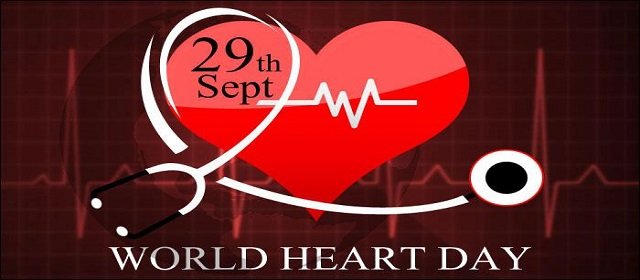Health
World Heart Day 2020: Interesting Facts About Heart You Need to Know

World Heart Day is a global campaign celebrated every year on 29 September to raise public awareness about cardiovascular diseases (CVDs), their prevention, and global effect. The theme for World Heart Day 2020 is “Use Heart To Beat Cardiovascular Disease”.
Cardiovascular diseases (CVDs) end the lives of 17.9 million individuals every year, according to information gathered by the World Health Organization (WHO), and it brings about 31% of every single global death.
These diseases, which show principally as heart attacks and strokes, are set off by excessive use of tobacco, unhealthy diets, an absence of physical activity, and alcohol misuse. These unhealthy lifestyle decisions bring about raised blood pressure, raised blood glucose, overweight and obesity, and dangers adverse to great heart health.
In May 2012, world leaders focused on raising awareness and scaling up the prevention of heart attack and strokes trying to diminish global mortality from non-communicable diseases by at least 25% by 2025. As indicated by the World Heart Federation, “Cardiovascular disease (CVD) is accountable for nearly half of all NCD deaths making it the world’s number one killer.” Even however cardiovascular diseases are regularly considered as afflictions that generally influence individuals living in developed nations, where this kind of sedentary lifestyle is common, over 80% of these deaths happen in low and middle-income, developing nations.
The foundation of the World Health Day occurred in 1999 with the World Heart Federation (WHF) teaming up with the World Health Organization (WHO). The idea of an annual event was brought about by Antoni Bayés de Luna, the president of WHF from 1997-2011. Initially, World Heart Day was seen on the last Sunday of September, with the first celebration occurring on September 24, 2000.
World Heart Federation is a non-governmental association and has, since its commencement, sponsored different events around the world, amassing and disseminating data and in any event, pronouncing themes for the celebration of this day. In 2020, in the wake of the Covid pandemic, the World Heart Federation urges individuals around the globe to ‘Use Heart to Beat CVD’, saying that, “In the time of Covid-19, taking care of your heart is more important than ever before.”
Why World Heart Day is Celebrated?
The World Heart Federation has been responsible for the association of World Heart Days. The first World Heart Day was seen on September 26, 1999. On this day partaking nations and NGOs working in them plan activities to spread more awareness about heart diseases, their causes, symptoms and how might one lead a heart-healthy life.
Common Cardiovascular Disease Risk Factors:
Cardiovascular disease risk factors can be divided into modifiable and non-modifiable factors.
- Non-modifiable factors:
These factors are not in your control. Consequently, they are named as non-modifiable. For instance, cardiovascular risks coming about out of aging are out of your control. Along these lines, maturing is a non-modifiable factor. Family history and diabetes are other non-modifiable factors.
- Modifiable factors:
Some cardiovascular disease-causing factors can be controlled, they are alluded to as modifiable factors. For instance, you can decide to eat better, exercise regularly, keep away from tobacco, and so on. Such activities will improve your heart’s health.
Frequent Checks:
Leading a healthy lifestyle is fundamental for a healthy heart. You need to eat, exercise, and sleep right. Be that as it may, non-modifiable factors can cause heart risk. Hence, it is pivotal to remain aware of what’s going on concerning your body’s key metrics. Here’s the elite of successive checks you have to perform so suitable steps can be taken to prevent/treat cardiovascular diseases.
- Blood pressure
- Blood glucose level
- Weight
- Cholesterol level
- Body Mass Index
Tips for a Healthy Heart:
- Exercise, dance, swim, or play a sport regularly
- Avoid Smoking, both active and passive
- Focus on a high-fiber diet
- Control blood pressure
- Take measures to lead a less stressful life if not a stress-free life·
- Avoid being seated at a stretch for a longer period
Health Insurance:
Buying the correct health insurance plan is a decent precautionary measure. It will assist you in dealing with your finances if there should arise an occurrence of healthcare issues. Here’s the elite of broadly accessible health insurance plans.
- Plan for an individual
- Plan for a family
- Critical Illness insurance
- Personal Accident policy
- Mediclaim
It is proposed to settle on appropriate health insurance plans and make a strong health insurance portfolio. For instance, you can select a family plan and go for a Critical Illness insurance policy with a spread for heart-related issues.
You can lead essential online research to comprehend which plans to suit your requirements. Purchasing health insurance online is simple and advantageous. Make a point to read the terms and conditions of the picked plan minutely to stay away from issues during the claim settlement process.
This World Health Day, have your part in making awareness about cardiovascular diseases. Make a vow to keep the hearts of your friends and family happy and healthy.
Interesting facts about World Heart Day
World Heart Day has been organized annually with the point of making individuals aware of the global heart disease emergency. A few people right up ’til today don’t have the foggiest idea of how to perceive the symptoms of heart disease. World Heart Day is organized to spread relevant knowledge about heart diseases, which thus can help invalidate fantasies around heart diseases. Here are a few World Heart Day facts:
- Almost 17 million individuals die globally of heart disease, and most don’t have important data about the disease in the first place.
- The World Heart Federation began with World Heart Day, to spread information about Heart Diseases.
- The first World Heart Day was celebrated on September 26, 1999.
- For the next few years, World Heart Day was celebrated on the last Sunday of September.
- Nonetheless, since 2013, World Heart is praised unilaterally on September 29, every year.
- Every Heart Day is praised along a specific fixed theme which enables spreading information in a lot simpler path as promoters and coordinators need to work around an extremely focused topic.
Interesting facts about the heart
- The heart is one of our most essential organs, providing the nutrition needed by all our other organs. Here are interesting facts about the heart.
- Around the world, 17.3 million individuals die each year from heart disease or stroke, which represents 31 percent of all deaths.
- Aristotle believed that the heart was the source of intelligence and the main function of the brain was to cool our blood.
- Every day, your heart makes enough energy to drive a medium-sized truck 20 miles.
- The heart of an unborn infant starts to beat around a month after conception.
- The words ‘heart’ and ‘blood’ can be found in all of Shakespeare’s plays.
- Blood enters the heart through its atriums and leaves through the ventricles. “Atrium” is Latin for “entrance hall” and “ventriculus” signifies “little belly”.
- A hummingbird’s heart beats around 20 times each second. A blue whale’s heart beats somewhere in the range of four and eight times each moment.
- The Blue Whale’s heart is the biggest in the world weighing 1,500 pounds
- Your heart is about the size of your two hands fastened together
- A child’s heart is about a similar size as your fist
- Your heart beats 100,000 times each day
- Regular exercise is a significant factor for heart health
- Heart disease is one of the heart’s greatest health threat
- The sound of pulses is made by the four valves of the heart opening and closing.
- Heart cancer is uncommon because heart cells don’t divide
- A woman’s normal heartbeat is faster than a man’s by around 8 beats a minute
- The heart of an average man beats about 70 times each minute
- The heart of a woman lady beats about 78 times each minute
- Your heart pumps around 1 million barrels of blood during an average lifetime
- The heart pumps out 2 ounces of blood at each heartbeat
- Every minute your heart pumps 1.5 gallons of blood around the body
- The correct side of the heart pumps blood into your lungs, the left side pumps oxygenated blood around the body
- A kitchen faucet would need to be turned on right for at least 45 years to approach the amount of blood pumped by the heart in an average lifetime
- Since the heart has its electrical impulse, it can keep on beat in any event, when isolated from the body giving it has a sufficient supply of oxygen
- A heartbeat can be distinguished by ultrasound about 6.5-7 weeks after conception
- 75 trillion cells in the body get blood from the heart, just the corneas get no blood supply
- Research has demonstrated that owning a cat can decrease the risk of heart attacks and strokes by over a third
- Your pulse can change contingent upon the music you listen to
- Your left lung is smaller than your right lung to make room for your heart
- An examination indicated vegetarians were 32% less likely to be admitted to hospital or die from heart disease
- Eating dark chocolate decreases the risk of heart disease
- The heart is found simply behind and marginally left of the breastbone
- The heart can pulsate more than 3 billion times in an individual’s lifetime
- Dying of a broken heart can occur, an investigation in more than 2000 heart attack survivors demonstrated attacks were far more likely after the death of a relative or dear companions than some other time
- A study uncovered coffee drinkers are less inclined to be hospitalized or stressed over heart mood rhythm disturbances
- It’s a legend that sneezing stops the heart
- The fetal heart is around twice as quick as an adult’s, at around 150 pulsates every minute
- Around 5% of blood supplies the heart, 15-20% goes to the brain and central nervous system, and 22% goes to the kidneys
- Early Egyptians believed that the heart and other significant organs had wills of their own and would move around inside the body
- The Greek Philosopher, Plato theorized that thinking started with the brain, yet that interests began in the ‘fiery’ heart
- The term ‘heartfelt’ started from Aristotle’s philosophy that the heart gathered sensory input from the peripheral organs through the veins
- The prolonged absence of sleep can cause irregular jumping pulses otherwise called Premature Ventricular Contractions (PVCs)
- Some heavy snorers may have a condition called Obtrusive Sleep Apnea (OSA) which can negatively influence the heart
- Medication use, especially cocaine, influences the heart’s electrical activity
- Galen of Pergamum, who was a noticeable surgeon to Roman gladiators, found that arteries carry blood
- Doctor Erasistratus of Chios (304-250 B.C.) was the first individual to find that the heart worked as a natural pump
- Squeezing a tennis ball firmly shows how hard the heart needs to attempt to pump blood around the body
- In 1903, physiologist Willem Einthoven (1860-1927) created the electrocardiograph, which measures the electric current which flows through the heart
- The walls of the heart’s left atrium are multiple times thicker than the right atrium
- The human heart isn’t ‘heart-shaped’, the heart of a cow is nearer to the shape
- Explicit to size, a typical aortic valve is >2cm2
- The first heart pacemakers connected to a wall socket
- Consistently, your heart makes enough energy to drive a truck for 20 miles
- Cardiovascular diseases are the main source of death, globally
- Overall, it takes around 45 seconds for blood to flow from the heart, all around the body
- Emotional vitality is related with a 28% decreased risk of coronary heart disease.
-

 Sports4 weeks ago
Sports4 weeks agoFIFA Club World Cup 2025: Complete List of Qualified Teams and Groups
-

 Sports3 weeks ago
Sports3 weeks agoAl Ahly vs Inter Miami, 2025 FIFA Club World Cup – Preview, Prediction, Predicted Lineups and How to Watch
-
Health2 weeks ago
Back to Roots: Ayurveda Offers Natural Cure for Common Hair Woes
-

 Tech2 weeks ago
Tech2 weeks agoFrom Soil to Silicon: The Rise of Agriculture AI and Drone Innovations in 2025
-

 Sports4 weeks ago
Sports4 weeks agoFIVB Men’s Volleyball Nations League 2025: Full Schedule, Fixtures, Format, Teams, Pools and How to Watch
-

 Startup3 weeks ago
Startup3 weeks agoHow Instagram Is Driving Global Social Media Marketing Trends
-

 Sports3 weeks ago
Sports3 weeks agoWorld Judo Championships 2025: Full Schedule, Date, Time, Key Athletes and How to Watch
-

 Sports2 weeks ago
Sports2 weeks agoFIBA 3×3 World Cup 2025: Full Schedule, Preview, and How to Watch













